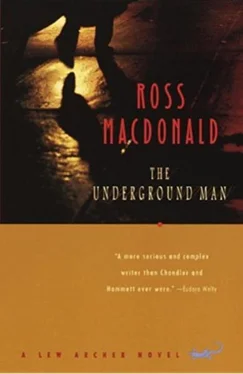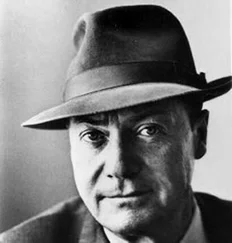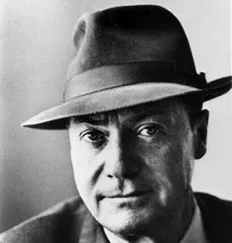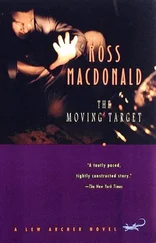I found Fritz Snow’s half-painted Chevrolet in a rutted lane behind a dusty oleander hedge. There was music leaking out of it. A small man in a baseball cap was sitting behind the wheel.
“What are you doing, friend?”
“Playing my organ.” He put a mouth organ to his lips again and played a few bars of wheezy blue music. I’m guilty, it seemed to say, but I’ve suffered enough – so have you.
“You play very well.”
“It’s a gift.”
He pointed skyward through the roof of the car. Then he blew a few more bars, and shook the spit out of his mouth organ. He smelled of wine.
“Is this your car?” I asked him.
“I’m watching it for a friend.”
I got in beside him. The key was in the ignition, and I took it. He gave me a glinting apprehensive look.
“My name is Archer. What’s your name?”
“Amos Johnstone. You got no right or reason to bust me. I’m really and truly watching it for a friend.”
“I’m not a cop. Is your friend a young woman with a little boy?”
“That’s her. She gave me a dollar – told me to sit in the car till she came back.”
“How long ago was that?”
“I dunno, I don’t carry a watch. Only thing I can swear to, it was today.”
“Before dark?”
He peered at the sky as if nightfall had taken him by surprise. “Must have been. I bought some wine with the dollar, and it’s gone.” He glanced around at me. “I could use another dollar.”
“Maybe we’ll get to that. Where did the young lady go?”
“Down the street.” He gestured in the direction of the marina.
“And she took the boy with her?”
“Yessir.”
“Was he all right?”
“He was scared.”
“Did he say anything?”
“He didn’t say a word to me. But he was shivering like a puppy.”
I gave the man a dollar and started back to the marina. He played me some farewell music which merged with the voices of the children playing in the dark.
There were a few scattered lights on the boats along the slips. A steadier, more brilliant light shone over the wire gate from the top of a metal pole. I took a quick look around and went over the gate, snagging one leg on the barbed wire across the top of it and coming down hard on my back on the slanting gangway. It shook me, and I stayed down for a minute.
My blood was beating in my ears and eyes as I approached the sloop. There was a light in the cabin, but no one on deck that I could see. In spite of the circumstances, there was something secret and sweet about the dark water, and something beautiful about the boat, like a corralled horse at night. I climbed over the railing into the cockpit. The mast towered up against the obscure sky.
There was a scuffling noise in the cabin. “Who’s that?” It was Jerry’s voice. He opened the hatchway and stuck out his head. His eyes were wide and glaring, and his open mouth was like a dark hole in his beard. He looked like Lazarus coming out of the tomb.
I reached for him, got hold of his body under the arms, lifted him up, and set him down hard in the cockpit on his back. He stayed down, as if he had hit his head. I felt a twinge of shame at hurting a boy.
I went down the ladder into the cabin, past a ship-to-shore radio and a chart table. On one of the two lower bunks a girl-shaped body was lying under a red blanket with only its blond hair showing, spilling like twisted gold across the pillow.
I pulled the blanket off her face. Her expression was queerly impassive. Her eyes looked at me from some other place, almost as if she was ready to die or perhaps already had.
Something besides her body was moving under the blanket. I stripped it off. She was holding the small boy against her, with one arm curled around his head and her hand over his mouth. He lay still beside her. Even his round blue eyes were perfectly still.
They flickered past me. I turned in the cramped space. Jerry was crouched on the ladder with a revolver held in both his hands.
“Get off this boat, you grungy pig.”
“Put the gun away. You’ll hurt somebody.”
“You,” he said. “Unless you get off here now. I’m in charge of this boat, and you’re trespassing.”
It was hard to take him seriously, but the gun helped. He waved it at me, and moved to one side. I climbed out past him, undecided whether I should try to take him or pass.
My indecision made me slow. Out of the corner of my eye I saw him shift the gun in his hands and swing it up by the barrel. I failed to avoid its fall. The scene spun away.
I was watching the cogwheels of the universe turning. It resembled, on a large scale, one of those boxes of gears that engineers fool around with in their spare time. I seemed to be able to see the whole apparatus at once, and to understand that the ratio of output to input was one to one.
Quiet water lapped at the edge of my attention. The side of my face was against a flat rough surface which seemed to rise and fall. The air seemed cooler, and I thought for a while that I was on the boat. Then I got up onto my hands and knees and saw that I was on the slip and that the space where Ariadne had lain was an oblong of dark water.
I dipped up some of the water in my hand and splashed it on my face. I was dizzy and depressed. I hadn’t taken the bearded boy seriously enough, and mishandled both him and the situation. I checked my wallet: the money was still in it.
I made my way up the gangway to a public rest station in the parking lot. I washed my face again, without looking too closely at it, and decided not to mess with the swelling on my head, which had stopped bleeding.
I found a pay phone, with a directory chained to it, on the outside wall of the building and called the sheriff’s office. The deputy on duty told me that the sheriff and most of his officers were in the fire zone. He was swamped with calls and had no one to send out.
I dialed the local Forest Service number. The female voice of an answering service informed me that no calls were taken after business hours, but she agreed to accept a message for Kelsey. I dictated a telegraphic version of recent events and listened to the operator read it back to me in a bored voice.
Next I looked up Brian Kilpatrick in the Real Estate section of the yellow pages. Both home and business numbers were listed for him. I called Kilpatrick’s home, got him immediately, and asked him if I could come and see him. He sighed.
“I just sat down with a drink. What’s on your mind?”
“Your son Jerry.”
“I see. Are you an officer?” His carefully modulated voice had flattened out.
“A private detective.”
“Does this have to do with the trouble at the harbor yesterday morning?”
“I’m afraid it does, and it’s getting worse. May I come and talk to you?”
“You still haven’t said what about. Is a girl involved in this?”
“Yes. She’s a young blond named Susan Crandall. Susan and your son and a little boy named Ron Broadhurst have taken off–”
“Is that Mrs. Broadhurst’s grandson?”
“Yes, it is.”
“Where in the name of heaven have they gone?”
“To sea. They took the Armistead yacht.”
“Does Roger Armistead know about this?”
“Not yet. I called you first.”
“Thank you,” he said. “You’d better come over as you suggest. Do you know where I live?” He gave me the address, twice.
I called a cab and repeated the address to the driver. He was one of the loquacious ones. He talked about fires and floods, earthquakes and oil spills. Why, he wanted to know, would anyone want to live in California? If things got any worse, he was going to move his family back to Motown. That was a city.
Читать дальше












